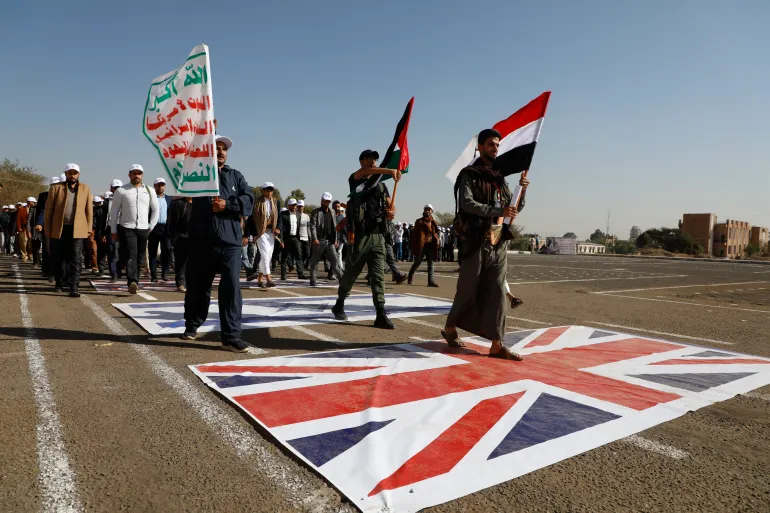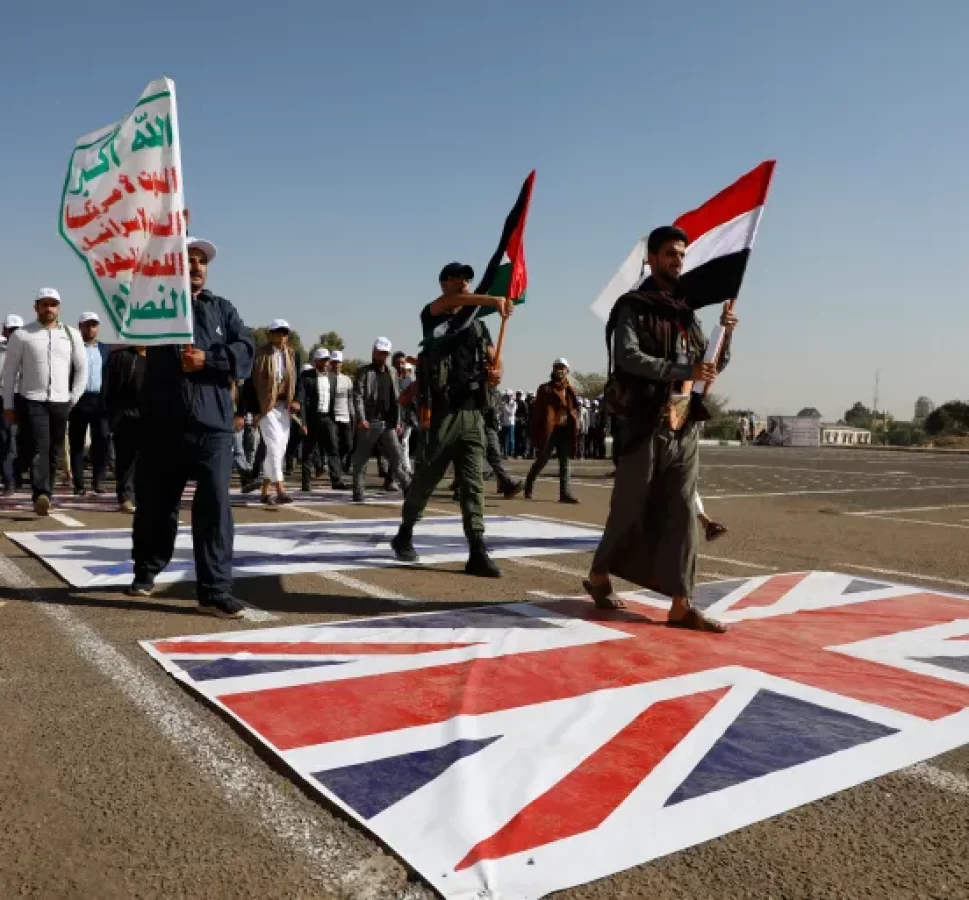
The war in Gaza has boosted recruits for the Yemeni group. But it has also complicated hopes for peace in Yemen.
Beirut, Lebanon – The Houthis have recruited and trained more than 200,000 new fighters since the group began its actions in the Red Sea in support of Palestine, a Houthi spokesperson says.
To pressure Israel for a ceasefire in Gaza, the group has been intercepting and attacking Israel-linked ships passing through the Bab al-Mandeb Strait on their way to the Suez Canal. Popular support gave the Houthis enormous political capital in Yemen and led to the recruitment of “tens of thousands” of new fighters, according to analysts and statements by the group.
Analysts are concerned that this surge may drastically alter the political landscape in Yemen and scupper any chances of a ceasefire in Yemen’s near-decade of civil war.
The Houthis have also widened their attacks to include ships linked to a United States-led coalition that is currently attacking their positions in Yemen.
Despite fears over future Houthi offensives that could hinder a ceasefire deal, Nasr al-Din Amer, a Houthi official who oversees the Yemeni news network Saba, told Al Jazeera that an agreement was still on the table.
“Opportunities for peace exist,” he said. “For our part, we do not intend to attack any party other than the Zionist, American and British enemies, because they are attacking us, and we do not have any intentions to target any internal party, unless it targets us to serve the Zionists.”
Tens of thousands of new fighters
“Yemenis are super passionate about the Palestinian cause and it gives the Houthis leverage,” Abdulghani al-Iryani, a senior researcher at the Sanaa Center for Strategic Studies, told Al Jazeera. So much so that it has pushed recruitment up “every single hour”, political commentator Hussain Albukhaiti, whose brother Mohammed is a member of the Houthi’s political bureau, said.
Based on his research, al-Iryani put the estimate of new Houthi fighters at close to 150,000 as of February 12. “Even the Houthis’ sworn enemies are with them as long as they are standing for Palestinians.”
The Houthis began their Red Sea actions in November and recruits started joining soon after, many under the impression that they would be able to fight Israel or their main backer, the US.
By January 11, the US had formed a coalition to “protect international shipping” and began attacking Houthi positions.
Most analysts say these attacks may have given Houthi recruitment a second boost, but that it was unlikely to be as significant as the first. Al Jazeera’s Sanad verification team said about 37,000 fighters had been recruited since the US air strikes began alone.
The Red Sea attacks and the US air strikes “undoubtedly helped them a great deal in mobilising support in comparison to pre-7 October, when the group’s popularity was noticeably flagging,” Nicholas J Brumfield, a Yemen analyst, told Al Jazeera.
Deployed in Yemen
The Houthis and various anti-Houthi forces have clashed since the April 2022 truce was announced but there have been no major offences while they were at the negotiating table. But analysts fear fighting could be renewed as the Houthis, bolstered by the new cohort, have already started to deploy some troops to flashpoints across Yemen.
“Even if all of this is a negotiating tactic, now they have all of these new fighters deployed to the fronts, it becomes a much easier decision … to say ‘Let’s launch an attack,’” Brumfield said. “While it is still unclear … how the Houthis will want to use all this accumulated force, the group is undeniably in a much more bellicose stance with regards to a ground war in Yemen than it was in early October 2023.”
Albukhaiti said the latest recruitment “will impact the entire region” and show “that any country can stand against the US, UK, Israel and the West.”
Among the new points of deployment is Marib, a region rich in natural resources that the Houthis tried to take multiple times before the truce. “That was one of many deployments,” al-Iryani said. “Clearly, they’re not going to march on Jerusalem so they might as well be deployed to the nearest city.”
The province has significant gas and oil reserves, and it’s a main base for the internationally recognised government. Losing it would be a massive blow for the Saudi-led coalition. But any offensive would likely have to be after the end of Israel’s war on Gaza, al-Iryani said, as doing it sooner would erode the “major political capital” amassed by the Houthis.
Major action after Gaza ceasefire
After nearly a decade of fighting, Riyadh is eager to end the war in Yemen and events since October have done little to change that, analysts said. But the process was upended by the war on Gaza, with the Houthi intervention angering the US and raising their profile as actors opposing the US and Israel.
This made the possibility of lasting peace in Yemen “nonexistent”, al-Iryani says. “The Houthis and Saudi Arabia will resume the peace process,” he said, “but the Houthis are now an integral part of the Axis of Resistance.”
The Axis, dubbed thus by Iran, includes Hamas, Hezbollah, and a loose coalition of groups in Iraq and Syria. Being part of it means the Houthis can expect continued engagement from the US and regional allies, like the United Arab Emirates, which supports several anti-Houthi groups in Yemen.
Should hostilities renew in Yemen, it is unclear what impact it could have on the Houthis’ popularity. The situation in Yemen is already called the world’s worst humanitarian crisis by UNHCR and another aid organisation working in Sanaa recently told Al Jazeera that Yemen was a “forgotten crisis”.
But that does not appear to be in the Houthis’ calculus at the moment, as their pro-Palestine rallies still dwarf any protest critical of aspects of their rule.
That may not last forever.
“After the ceasefire [in Gaza],” al-Iryani said, “we will see major action.”
Is the civil war over?
The Houthis, also known as Ansar Allah, fought a civil war with a Saudi-led military coalition backing Yemen’s internationally recognised government (IRG) since March 2015, months after the Houthis’ September 2014 taking of the capital, Sanaa.
Their takeover forced the IRG to retreat to the coastal city of Aden in the south, and the coalition soon intervened on its behalf. After the better part of a decade at war, the two sides came to a truce in April 2022 that halted the fighting and began permanent ceasefire talks. They were on the verge of announcing a breakthrough deal that would end the nine-year war between the two. This announcement was delayed due to the war in Gaza.
Now, analysts say a ceasefire looks very unlikely after the recent developments, including the Red Sea actions, a large influx of new military recruits, and US and UK attacks on Houthi positions.






